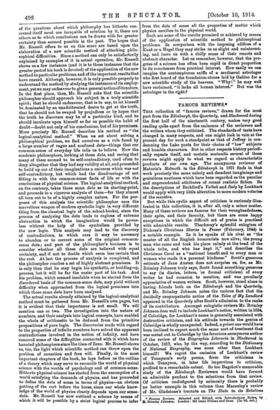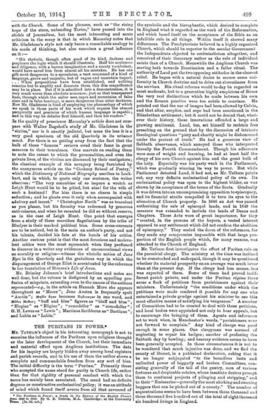FAMOUS RE V 1.LWS."
B Brimley Johnson.
Tins collection of "famous reviews," drawn for the most part from the Edinburgh, the Quarterly, and Blackwood during the first half of the nineteenth century, makes very good reading quite apart from the eminence of the reviewers and the writers whom they criticized. The standards of taste have changed in many respects, and one might look in vain at the present day for such a standpoint as that of Jeffrey in con- demning the Lake poets for their choice of "low" subjects and humble characters. But in other respects history periodi- cally repeats itself, and mutatis mutandis several of these reviews might apply to what we regard as characteristic, products of our own age. The anonymous reviewer of Maturin's Melmoth in the Edinburgh in 1821 finds in that work precisely the same unholy and decadent imaginings and gratuitous nastiness which have been regarded as the peculiar and unprecedented attributes of recent realistic fiction. So the descriptions of Beckford's Vathelc and Italy by Lockhart would apply with very little alteration to more modern votaries of the macabre.
But while this cyclic aspect of criticism is curiously illus- trated in this collection, it is, after all, only a minor matter. Many of these reviews are famous for their wrongheadedness, their spite, and their ferocity, but there are some happy exceptions in which the difficult art of praise is practised with admirable results. Thackeray's splendid eulogium of Dickens's Christmas Stories in Fraser (February, 1844) is a notable example. In it he speaks of his rival as "the master of all the English humourists now alive; the young man who came and took his place calmly at the head of the whole tribe, and who has kept it," and describes the Christmas Carol as a "national benefit and to every man or woman who reads it a personal kindness." Scott's generous estimate of Jane Austen does not surprise us, for, as Mr. Brimley Johnson truly says, Scott found something generous to say (in diaries, letters, or formal criticism) of every writer he had occasion to mention, and was peculiarly appreciative of women writers. Scott, however, stood alone in having friends both on the Edinburgh and the Quarterly, and Mr. Brimley Johnson notes the curious fact that the decidedly unsympathetic notice of the Tales of My Landlord appeared in the Quarterly after Scott's admission to the ranks of its contributors. Amongst eulogistic reviews Mr. Brimley Johnson does well to include Lockhart's notice, written in 1834, of Coleridge, for Lockhart's name is generally associated with destructive criticism, and his attitude towards the genius of Coleridge is wholly unexpected. Indeed, a priori one would have been inclined to expect much the same sort of treatment that was meted out to Coleridge by the ferocious anonymous author of the review of the Biographia Literaria in Blackwood in October, 1817, who, by the way, according to the Dictionary of National Biography, was none other than Lockhart himself ! We regret the omission of Lockhart's review of Tennyson's early poems, from the criticisms in which Tennyson, in later life impervious to criticism, profited to a remarkable extent. So too Bagehot's memorable study of the Edinburgh Reviewers would have formed an admirable pendant to the selections from that review. Of criticism undisfigured by animosity there is probably no better example in this volume than Macaulay's review of Mr. Gladstone's tractate on The State in its Relations
Selected and Edited, with Introductory Notes, by London ; Sir Isaac Pitman and Sons. [7s. 6d. not.]
with the Church. Some of the phrases, such as " the rising hope of the stern, unbending Tories," have passed into the cliches of journalism, but the most interesting and acute criticism in the essay is that in which Macaulay notes that Mr. Gladstone's style not only bears a remarkable analogy to his mode of thinking, but also exercises a great influence on it :— " His rhetoric, though often good of its kind, darkens and perplexes the logic which it should illustrate. Half his acuteness and diligence, with a barren imagination and a scanty vocabulary, would have saved him from almost all his mistakes. He has one gift most dangerous to a speculator, a vast command of a kind of language, grave and majestic, but of vague and uncertain import. . . When propositions have been established, and nothing remains but to amplify and decorate them, this dim magnificence may be in place. But if it is admitted into a demonstration, it is very much worse than absolute nonsense; just as that transparent haze, through which the sailor sees capes and mountains of false sizes and in false bearings, is more dangerous than utter darkness. Now Mr. Gladstone is fond of employing the phraseology of which we speak in those parts of his work which require the utmost perspicuity and precision of which human language is capable ; and in this way he deludes first himself, and then his readers."
In the quality of prescience Macaulay's article does not com- pare with Walter Bagehot's study of Mr. Gladstone in the sixties," nor is it exactly judicial, but none the less it is a very good specimen of the old Quarterly in its nrbaner mood. For there is no getting away from the fact that the bulk of these " famous " reviews owed their fame in great measure to their truculence. One marvels on reading them
to note the extent to which the personalities, and even the private lives, of the victims are discussed by their castigators ; the classical example of this savagery being furnished by
the anonymous article on the " Cockney School of Poetry," which the Dictionary of National Biography ascribes to Lock-
hart, and in which, to quote only one sentence, the writer observes : "The very concubine of so impure a wretch as Leigh Hunt would be to be pitied, but alas ! for the wife of
such a husband l For him there is no charm in simple seduction ; and he gloats over it only when accompanied with adultery and incest." "Christopher North" was as truculent as you please, but his ferocity was redeemed by generous enthusiasms, and when he recanted he did so without reserve, as in the case of Leigh Hunt. One point that emerges from a study of these merciless flagellation by the tribe of Bludyer is their marked political bias. Some cross-currents are to be noticed, but in the main an author's party, and not his talents, decided his fate at the hands of his critics. Another curious point is that the most ferocious and malevo-
lent critics were the most squeamish when they professed to discover in a writer any evidences of unconventional views
on morality or religion—witness the vitriolic notice of Jane Byre in the Quarterly and the gratuitous way in which the disparagement of George Eliot is accentuated by the reference to her translation of Strauss's _Life of Jesus.
Mr. Brimley Johnson's brief introductions and notes are well done, but the volume is disfigured by an appalling pro- fusion of misprints, extending even to the names of the authors represented—e.g., in the article on Hannah More she appears throughout as " Moore "; Jane Austen is frequently spelt "Austin"; Bleb/ tar becomes rrescenae in one word, and eNees meeex; "buff and blue" figures as "bluff and blue " ; "Elegiac" as " Eligiac" ; " remodeller " as " romodoller " ; G. H. Lewes as " Lewis " ; Martinus Scriblerus as " Bartinus "; and Lubin as " Lubin."



































 Previous page
Previous page